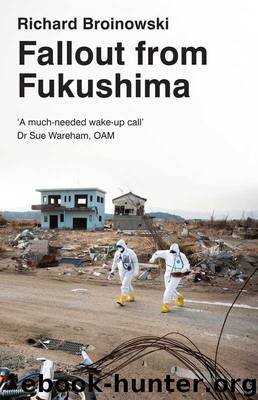Fallout from Fukushima by Richard Broinowski

Author:Richard Broinowski
Language: eng
Format: epub
Tags: POL000000, POL044000, TEC028000, SCI058000, NAT011000
Publisher: Scribe Publications Pty Ltd
Published: 2012-09-25T16:00:00+00:00
Chapter Seven
Nuclear Nations
THE CATASTROPHE AT Fukushima generated immediate environmental concern. Japan was offered technical advice about containing the situation from the International Atomic Energy Agency, the World Meteorological Organisation, and the Preparatory Commission for the Comprehensive Nuclear-Test-Ban Treaty Organisation, whose radiation-detection equipment is deployed around the world. Many countries that sent emergency aid, including pharmaceuticals to counter radiation, simultaneously advised their nationals to leave Tokyo. Some governments temporarily relocated their Tokyo embassies to southern Japan. Authorities in Moscow said they were ready to evacuate Russian inhabitants from the Kuril Islands and Sakhalin (adjacent to northern Japan) if need be. Stock prices of energy companies that were reliant on nuclear power dropped, and in some countries demand for renewable-energy systems soared.
Non-government organisations quickly expressed their own environmental anxieties. On 29 March 2011, the independent World Future Council, based in Hamburg, called on the global community to exercise much more care in dealing with technologies capable of causing mass annihilation, and to phase out, abolish, and replace them with alternatives that would not threaten present and future generations. Environmental activists at a United Nations conference in April 2011 ‘urged bolder steps to tap renewable energy so the world doesn’t have to choose between the dangers of nuclear power and the ravages of climate change.’
How much weight do such sentiments carry with the international nuclear industry, or among communities that support it? Before answering this question, it is important to run a reality check on the state of the industry.
Before Fukushima, the international nuclear lobby was predicting a sudden surge in demand for nuclear power in response to global warming. This ‘nuclear renaissance’ would involve increasingly sophisticated nuclear reactors replacing fossil-fuelled power plants to satisfy an ever-increasing demand for electricity. What the lobby usually avoided acknowledging, however, was that for several years nuclear power had been slowly contracting as a percentage of global electricity generation — a contraction that the nuclear industry had been unable to arrest. One of the most authoritative accounts of this trend is Nuclear Power in a Post-Fukushima World: 25 years after the Chernobyl accident. Written by three scientific researchers (Mycle Schneider, Antony Froggat, and Steve Thomas), Nuclear Power was commissioned by the independent Washington-based Worldwatch Institute and published in Paris, Berlin, and Washington in April 2011.
The report found that the global ‘fleet’ of power reactors was ageing rapidly, and that not enough new ones would come online to replace them as they were decommissioned. As of 1 April 2011, 437 reactors operated around the world, seven fewer than in 2002. Of these, 143 were operating in the European Union, down from a maximum of 177 units in 1989. The failure to construct replacement reactors was linked to grid suitability, high capital costs, long start-up times, scarcity of expertise and specialised materials, lack of public support because of safety concerns, and, increasingly, technical problems with reactor fleets, especially in some of the larger nuclear countries. Between 2008 and 2009, electricity generation by nuclear means declined in four of the ‘big six’ countries — France, Germany, Japan, and the United States.
Download
This site does not store any files on its server. We only index and link to content provided by other sites. Please contact the content providers to delete copyright contents if any and email us, we'll remove relevant links or contents immediately.
| Energy |
The Lonely City by Olivia Laing(4540)
Animal Frequency by Melissa Alvarez(4127)
All Creatures Great and Small by James Herriot(3954)
Walking by Henry David Thoreau(3660)
Exit West by Mohsin Hamid(3612)
Origin Story: A Big History of Everything by David Christian(3451)
COSMOS by Carl Sagan(3317)
How to Read Water: Clues and Patterns from Puddles to the Sea (Natural Navigation) by Tristan Gooley(3212)
How to Do Nothing by Jenny Odell(3081)
The Inner Life of Animals by Peter Wohlleben(3076)
Hedgerow by John Wright(3066)
How to Read Nature by Tristan Gooley(3052)
Project Animal Farm: An Accidental Journey into the Secret World of Farming and the Truth About Our Food by Sonia Faruqi(2989)
Origin Story by David Christian(2966)
Water by Ian Miller(2937)
A Forest Journey by John Perlin(2887)
The Plant Messiah by Carlos Magdalena(2733)
A Wilder Time by William E. Glassley(2662)
Forests: A Very Short Introduction by Jaboury Ghazoul(2652)
